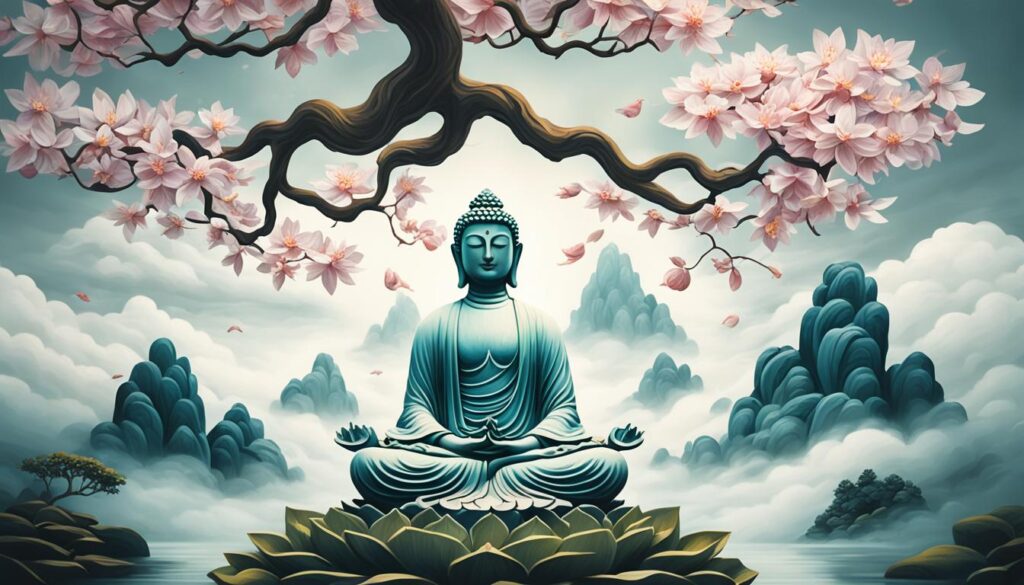“Thousands of candles can be lit from a single candle, and the life of the candle will not be shortened. Happiness never decreases by being shared.” – Buddha
Buddhism, one of the world’s major religions, offers profound insights into the nature of existence and the human experience. Its teachings provide a path towards personal transformation and societal harmony, addressing both individual and collective challenges. What does Buddhism teach? It encompasses a rich philosophy, ethical principles, and practical practices that guide individuals in their quest for understanding and enlightenment.
In this article, we will explore the core teachings of Buddhism, delve into the legend of its founder Shakyamuni, and shed light on the basic tenets that shape its beliefs and practices. We will also examine how Buddhism’s teachings can be applied in modern life, offering valuable tools for finding inner peace, navigating relationships, and addressing the complex issues of our time. Furthermore, we will discover the impact of Buddhism on art, culture, and the world at large.
Join us on this journey as we delve into the teachings of Buddhism, unveiling its transformative power and inspiring wisdom.
Key Takeaways:
- Buddhism offers profound insights into the nature of existence and the human experience.
- Its teachings provide a path towards personal transformation and societal harmony.
- Central to Buddhism are ethical principles, practical practices, and a rich philosophy.
- Buddhism’s teachings can be applied in modern life, offering tools for finding inner peace and addressing contemporary challenges.
- Buddhism has had a profound influence on art, culture, and the world at large.
The Legend of Shakyamuni
According to Buddhist tradition, Shakyamuni, also known as Siddhartha Gautama, is the founder of Buddhism. Born into a royal family, Shakyamuni’s journey began when he left the opulence of the palace in search of the true meaning of life. It was during this quest that he encountered the profound “Four Sights” that forever changed his path: old age, sickness, death, and a seeker of religious truth.
These sights served as catalysts, inspiring Shakyamuni to embark on a spiritual journey to seek enlightenment and understand the nature of human existence. He renounced his privileged life and embraced a life of simplicity and self-discovery, seeking the ultimate truth.
For many years, Shakyamuni immersed himself in intense practices of asceticism, pushing his physical and mental boundaries in pursuit of enlightenment. However, he realized that extreme asceticism did not hold the key to liberation.
Finally, Shakyamuni discovered the Middle Way, a balanced approach that transcended both indulgence and extreme self-mortification. Meditating under the Bodhi tree, he achieved a state of profound realization and became known as the Buddha, meaning the “awakened one.”
From that moment forward, the Buddha dedicated his life to sharing his profound insights and teachings with others. His teachings, often referred to as the Dharma, provided guidance on how to find liberation from suffering and attain enlightenment.
Through his teachings, the Buddha emphasized the importance of self-exploration, self-discipline, and self-realization. He encouraged his disciples to question the status quo and search for the deeper meaning of existence.
The legend of Shakyamuni, the seeker turned enlightened teacher, serves as an inspiration for all those who are on their own journey of self-discovery and pursuit of the true meaning of life.

The Basic Tenets of Buddhism
Buddhism is built upon several fundamental principles that guide individuals towards liberation from suffering. These principles encompass the essence of the Buddha’s teachings, encompassing concepts such as Dharma, reincarnation, karma, the Four Noble Truths, suffering, craving, nirvana, and the Eightfold Path.
The Dharma: Guiding Towards Liberation
Central to Buddhism is the Dharma, which encompasses the teachings of the Buddha. It serves as a guiding light, illuminating the path towards liberation from suffering and the attainment of enlightenment. The Dharma provides wisdom, insights, and practical guidance for individuals seeking to overcome the challenges of existence and find true peace within themselves.
Reincarnation and Karma: The Cycle of Birth and Death
Buddhists believe in reincarnation, the eternal cycle of birth, death, and rebirth. Reincarnation is governed by the principle of karma, which states that one’s actions have consequences in this life and future lives. Every action, thought, and intention influences one’s future experiences, shaping the trajectory of one’s existence and spiritual evolution.
The Four Noble Truths: Understanding Suffering and Its Cessation
The Four Noble Truths lie at the heart of Buddhist thought. They offer profound insights into the nature of human suffering and provide a roadmap for its alleviation. These truths explain that suffering is an inherent part of existence, arising from craving and attachment. However, they also teach that suffering can be brought to an end by relinquishing attachment and craving, leading to the attainment of true happiness and liberation.
Nirvana: Liberation from the Cycle of Rebirth
The ultimate goal of Buddhism is to achieve nirvana. Nirvana represents liberation from the ceaseless cycle of rebirth and the complete cessation of suffering. It is the state of ultimate peace, wisdom, and realization that brings an end to all attachments and desires. By transcending the limitations of the ego and connecting with the deeper truth of existence, individuals can attain nirvana and experience profound liberation.
The Eightfold Path: Guiding Towards Enlightenment
The Eightfold Path provides a comprehensive framework for moral conduct, mental discipline, and wisdom. It consists of eight interconnected principles: right understanding, right thought, right speech, right action, right livelihood, right effort, right mindfulness, and right concentration. This path guides individuals towards the cultivation of wholesome qualities and the development of a clear and focused mind, leading them closer to enlightenment and the realization of truth.

Bodhisattvas and the Path of Compassion
Within certain schools of Buddhism, the significance of bodhisattvas is emphasized. Bodhisattvas are enlightened beings who voluntarily postpone their final enlightenment until all other sentient beings are liberated from suffering. These compassionate beings embody the ideal of compassion and dedicate themselves to alleviating the suffering of others while spreading the teachings of the Buddha.
The concept of bodhisattvas is closely linked to the goal of enlightenment and the pursuit of nirvana. While personal enlightenment is a noble aspiration, bodhisattvas choose to forgo their own liberation to assist others on their spiritual journey.
The path of compassion followed by bodhisattvas reflects the core values of Mahayana Buddhism, one of the major branches of Buddhism. Mahayana Buddhism places a strong emphasis on helping others and cultivating compassion as a means to reach enlightenment. The bodhisattva ideal inspires practitioners to engage in acts of kindness, selflessness, and empathy, with the ultimate aim of liberating all beings from the cycle of suffering.

Buddhism’s Teachings in Modern Life
Buddhism’s teachings are not limited to ancient times, but they offer valuable insights for navigating the challenges of modern life. In a world that can often feel chaotic and overwhelming, Buddhism provides tools and practices that can help you find balance and inner peace.
The Power of Mindfulness
One of the key teachings of Buddhism is mindfulness, the practice of being fully present in the moment. By cultivating mindfulness, you can learn to quiet the mind, reduce stress, and develop a greater sense of clarity and focus. Mindfulness allows you to appreciate the beauty and richness of each moment, helping you find peace and contentment in the midst of a busy and demanding world.
The Transformative Practice of Meditation
Meditation is a cornerstone of Buddhist practice and has been recognized for its numerous benefits in modern scientific research. Through meditation, you can cultivate a calm and peaceful mind, improve concentration and mental clarity, and develop a greater sense of self-awareness and compassion for others. Regular meditation practice can help reduce anxiety and depression, improve overall well-being, and create a deeper connection to yourself and the world around you.
Building Societal Harmony through Compassion
Buddhism places a strong emphasis on compassion, both towards oneself and others. By cultivating a compassionate mindset, you can foster harmonious relationships and contribute to the creation of a more just and peaceful society. Compassion allows you to see the interconnectedness of all beings and instills a sense of responsibility to work towards the well-being of others. By addressing modern challenges with compassion, we can build a better world for ourselves and future generations.
Buddhism’s Influence on Art and Culture
Buddhism has had a profound influence on art and culture throughout its history. The rich tapestry of Buddhist art and architecture reflects the deep spiritual beliefs and teachings of the religion. From exquisitely crafted statues to vibrant paintings and intricate temple designs, Buddhist art captures the essence of the faith and serves as a visual representation of its core principles.

Buddhist architecture, with its ornate pagodas, serene monastic retreats, and sacred pilgrimage sites, showcases the fusion of spiritual and aesthetic ideals. These architectural marvels not only serve as places of worship and meditation but also stand as testaments to the devotion and dedication of Buddhist practitioners.
Buddhist festivals, such as Vesak or Bodhi Day, are celebrated with great enthusiasm by millions of Buddhists around the world. These colorful and joyous events offer an opportunity for the community to come together, express gratitude, and pay homage to the Buddha and his teachings. Buddhist festivals not only foster a sense of cultural identity but also promote intercultural dialogue, contributing to the cultural diversity and harmony of societies.
Buddhism’s cultural impact extends beyond the realm of visual arts and festivals. Its profound philosophical and ethical teachings have inspired numerous literary works, music compositions, and other forms of artistic expression. Buddhist ideas and symbols have found their way into poetry, novels, songs, and even contemporary artworks, engaging people across generations and cultures.
Conclusion
Embracing the transformative power of Buddhism’s teachings can have a profound impact on your life, fostering personal and societal harmony. By incorporating mindfulness, compassion, and ethical conduct into your daily life, you can cultivate a sense of inner peace and find meaning in your journey.
Buddhism’s emphasis on mindfulness teaches you to be fully present in the moment, enabling you to appreciate life’s joys and navigate its challenges with clarity and equanimity. Through compassionate action, you can contribute to a more peaceful and empathetic society, extending kindness and understanding to others.
As you embark on your own spiritual journey, the principles of Buddhism offer a guiding light. They remind you to approach life with an open heart, nurturing personal growth, and enabling you to make a positive difference in the world. By embracing the wisdom of Buddhism, you can unlock the transformative power within yourself and create a life filled with meaning and fulfillment.
FAQ
What are the core teachings of Buddhism?
The core teachings of Buddhism include the Dharma, which refers to the teachings of the Buddha, the belief in reincarnation and karma, and the Four Noble Truths, which explain the nature of suffering, its cause, its cessation, and the path to end suffering.
Who is Shakyamuni and what is his significance in Buddhism?
Shakyamuni, also known as Siddhartha Gautama, is considered the founder of Buddhism. He was a prince who left his palace to seek the meaning of life and eventually achieved enlightenment, becoming the Buddha. His teachings form the basis of Buddhist philosophy.
What is the goal of Buddhism?
The goal of Buddhism is to achieve nirvana, a state of liberation from the cycle of rebirth and suffering. This is accomplished by following the Eightfold Path, which consists of moral conduct, concentration, and wisdom.
What role do bodhisattvas play in Buddhism?
Bodhisattvas are enlightened beings who vow to postpone their final enlightenment until all other beings are liberated from suffering. They embody compassion and work to alleviate the suffering of others while spreading the teachings of the Buddha.
How do Buddhism’s teachings apply to modern life?
Buddhism’s teachings offer valuable insights and practices for navigating the challenges of modern life. Mindfulness and meditation, key practices in Buddhism, have been widely studied and shown to have numerous benefits for mental and physical well-being. Buddhism’s emphasis on compassion and ethical conduct provides a framework for building harmonious relationships and creating a more just and peaceful society.
How has Buddhism influenced art and culture?
Buddhism has had a profound influence on art and culture throughout history. Buddhist art, characterized by statues, paintings, and intricate temple architecture, often depicts the life and teachings of the Buddha. Buddhist festivals celebrated by Buddhists worldwide contribute to the cultural diversity of communities. Buddhist ideas and symbols have also influenced literature, music, and other forms of artistic expression.
What impact does embracing Buddhism have on personal and societal harmony?
Embracing the teachings of Buddhism can bring about transformation and inner peace on a personal level. By practicing mindfulness, compassion, and ethical conduct, individuals can find meaning and joy in their journey through life. On a societal level, Buddhism promotes values of peace, compassion, and social justice, contributing to a more harmonious and compassionate world.

